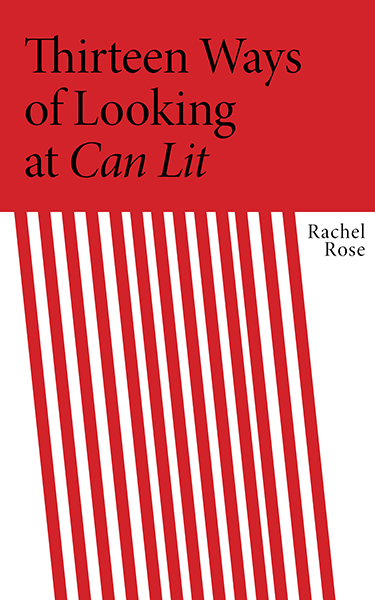 Thirteen Ways of Looking at CanLit
Thirteen Ways of Looking at CanLit
Rachel Rose, BookThug, bookthug.com, $10
Rachel Rose’s Thirteen Ways of Looking at CanLit, published this year by BookThug, is heavy; this collection of poetry comes with its own thud. It’s weighed down with ham-fisted themes and colloquialisms that pound the reader from start to completion, but, incredibly, not in a manner that agitates or diminishes. Instead, even during a first read, while acquainting yourself with the deeply personal tone of the collection’s narrator, the maladroit and almost blundering metre feels purposeful, making it somewhat easier to swallow.
Rose isn’t offering a Norton Anthology version of critical theories about an imaginary quaint state of Canadian Literature. Instead, almost all 13 poems wrestle to the ground bulky intersections between writing and the body, specifically our sexual bodies. Rose is interested in cranking up the ugly, slapping, and slick sounds of us as writers, as lovers, as readers and consumers of Canadian Literature; she wants to put us and our hideous flaws on display. She doesn’t do this eloquently, and she doesn’t want to. She does it with bright bold statements that scream and tug with every word choice.
Although relatively homogeneous, the 13 poems manage to stand alone as independent statements from the grander chapbook and its massive agenda. Rose weaves topical issues into the grander themes, including: sex work, white privilege and LGBTQ community engagement. The intense light of her language is used to tease out the hypocrisy of Canadian social justice agendas, while simultaneously exposing some of CanLit’s most notorious problems (let’s not mince words: we are talking about nepotism and sexism).
Some of the pieces manage to depart slightly from her tub-thumping second wave radical theorizing to dabble in more gentle nuance, with gorgeous and import-ant questions like:”What if we mentor ourselves as we wish we’d been mentored,/then pass it on”. With a thick and forceful rhythm, and an internal narrative that expresses itself as a struggle between two lovers, this collection is well worth the $10. (Lyndsay Kirkham)
